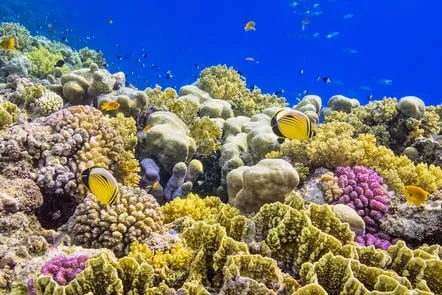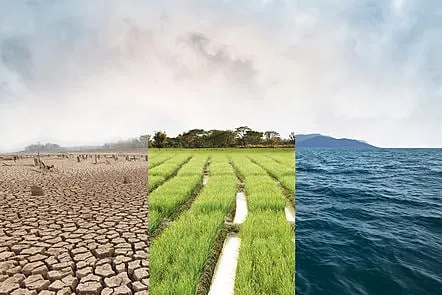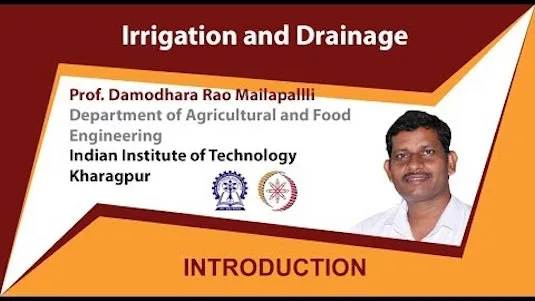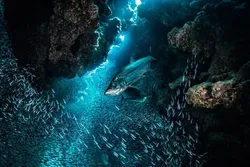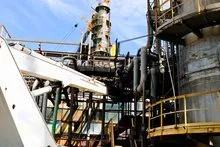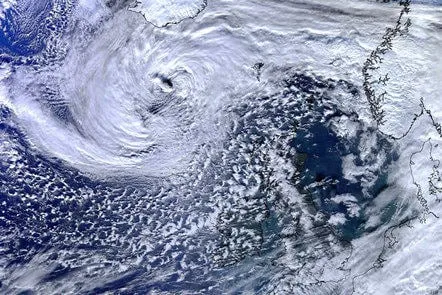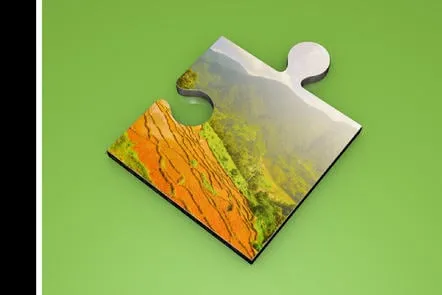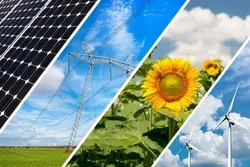Free Online Environmental Science Courses and Certifications 2024
Environmental Science is the study of the environment and its interactions with living and non-living things. It covers a wide range of topics, from climate change to conservation. Courses in Environmental Science are available at many universities, and the field is suitable for those interested in ecology, biology, and sustainability. People who study Environmental Science can pursue careers in research, policy, and education.
Popular Courses
Explore the essentials of Advanced Erosion Control Measures
Learn MoreThis course provides an introduction to environmental studies for undergraduates. It covers topics such as environmental science, environmental issues, and human-environment interactions. Students will gain an understanding of the natural environment, the impact of human activities on the environment, and the importance of sustainable development. They will also learn about the various environmental problems and solutions.
Learn MoreThis course provides an introduction to the principles of ocean seakeeping and manoeuvring. It covers topics such as regular and irregular water waves, ship motions, dynamic effects, added resistance, types of directional stability, hydrodynamic derivatives, standard manoeuvres, control surface and control derivatives. Through this course, students will gain knowledge and skills to understand and apply the principles of ocean seakeeping and manoeuvring.
Learn MoreThis course will explore the global context of COP26, the UN Convention on Biological Diversity, and the UN Sustainable Development Goals. It will examine the work of educators and communities in Scotland who have been involved in COP26-related activities, and investigate creative responses to the complex themes of COP26. Through this course, students will gain an understanding of how individuals, communities, and organisations can work together to create a more sustainable future in the face of climate change and environmental sustainability.
Learn MoreThis course provides an overview of the science behind climate change. It covers topics such as the causes and effects of climate change, the current state of the climate, and potential solutions. It also examines the role of human activity in climate change and the potential impacts of climate change on the environment and society. Students will gain an understanding of the science behind climate change and the implications of our actions.
Learn MoreThis course introduces the IUCN Red List of Ecosystems, a global standard for assessing the health of ecosystems. It covers the criteria used to assess ecosystems, the process of assessing them, and the implications of the results. It also explores the role of conservation in protecting ecosystems and the importance of sustainable development. Participants will gain an understanding of the importance of ecosystems and the need to protect them.
Learn MoreThis online course will help you understand the environmental challenges we face today and how to tackle them. You will learn about the causes and effects of climate change, the importance of sustainable development, and how to reduce your environmental impact. You will also explore the role of governments, businesses, and individuals in creating a more sustainable future. Join us to gain the knowledge and skills to make a difference.
Learn MoreThis online course provides an introduction to the study of soils. It covers topics such as soil formation, soil composition, soil classification, soil fertility, and soil management. It also explores the importance of soils in the environment and how they can be managed for sustainable use. Students will gain an understanding of the physical, chemical, and biological properties of soils and how they interact with the environment.
Learn MoreThis online course provides an overview of the causes and effects of climate change, as well as potential solutions. It covers topics such as renewable energy, carbon capture and storage, and sustainable agriculture. It also explores the economic, social, and political implications of climate change. The course is designed to equip students with the knowledge and skills to develop and implement effective climate change solutions.
Learn MoreThis course provides an introduction to the principles of irrigation and drainage in agricultural engineering. It covers topics such as soil-water-plant-atmosphere relationships, crop water requirements, irrigation scheduling, water conveyance, water application methods, irrigation systems design and performance evaluation, drainage of agricultural lands, management of salt affected soils, ground water hydrology, irrigation wells and water-lifting devices. It is suitable for undergraduate and graduate students in Agricultural Engineering/Agricultural Sciences with a background in chemistry, physics and maths. It includes weekly quizzes, in-class numerical problem solving, assignments and class tests.
Learn MoreThis online course explores the wonders of our ocean. Learn about the ocean's biodiversity, its importance to our planet, and the threats it faces. Discover how we can protect and conserve our ocean and its resources for future generations. Through interactive activities, videos, and discussions, you will gain a deeper understanding of the ocean and its importance.
Learn MoreThis course provides an overview of computer methods for structural analysis of offshore structures. It covers fundamentals of advanced structural analysis, with special emphasis on its application to offshore structures. Topics include 2D and 3D structures, problem formulation and solution using MATLAB coding, and hands-on experience with Matlab. Intended for Civil, Mech, Aero, Appl. Mech., Naval arch., Structures, the course is supported by ONGC, Reliance, UGC, and Technip. No prerequisites are required.
Learn MoreThis online course will teach you how to make the most of any weather. You'll learn how to dress for the elements, plan outdoor activities, and make the most of any situation. You'll also learn how to stay safe and healthy in any weather. With this course, you'll be prepared for whatever Mother Nature throws your way!
Learn MoreThis online course explores the ethical and legal issues surrounding natural resource management. It examines the principles of environmental justice and how they can be applied to the management of natural resources. Topics include the history of environmental justice, the role of stakeholders, and the impact of climate change. Students will gain an understanding of the challenges and opportunities of natural resource management in a global context.
Learn MoreThis online course explores the transformation of energy systems and the governance of energy policies. It covers topics such as energy markets, energy security, energy efficiency, renewable energy, and climate change. It also examines the role of governments, businesses, and civil society in the energy transition. The course provides an understanding of the challenges and opportunities of energy system transformation. It also provides insights into the policy and regulatory frameworks needed to support the transition.
Learn MoreThis course provides an overview of Ecology and Environment, focusing on sustainability, climate change, economics, ethics, water quality and treatment, waste management and treatment, urban drainage, energy demand and resources, pollutant pathways, life cycle assessment, urban planning, transport, energy, waste, governance, biodiversity, restoration and ecological engineering. It also covers risk assessment, liability, historical impact of economy on ecology, and solid and hazardous waste management.
Learn More Environmental Science Courses
Career Trends
Career Prospects
| Average Salary | Position Overview
|
| Environmental Engineer | $94,883 per year
| Environmental engineers utilize their knowledge of engineering, soil science, biology, and chemistry to create effective solutions for environmental issues. Their primary focus is on enhancing recycling practices, waste management, safeguarding public health, and controlling air and water pollution. |
| Environmental Scientist | $63,220 per year | Environmental scientists are responsible for collecting and consolidating environmental data from various sources such as air, soil, water, food, and other materials for scientific analysis. They evaluate this data along with surveys and other information to identify and assess potential environmental hazards. Based on their findings, they create plans to prevent, control, or address environmental issues such as land or water pollution. |
| Science Teacher | $72,929 per year | Science teachers play a crucial role in facilitating student exploration and comprehension of fundamental scientific concepts such as problem-solving and the gathering of evidence to support ideas or decisions. They develop lesson plans, demonstrate scientific concepts, and grade tests and assignments to evaluate student learning. |
| Project Manager | $111,255 per year | A project manager is a skilled professional who coordinates, strategizes, and implements projects while adhering to constraints such as budgets and deadlines. They oversee and manage entire teams, establish project objectives, communicate with stakeholders, and ensure the successful completion of a project from start to finish. |
Educational Paths
1. Bachelor's Degree in Environmental Science: A bachelor's degree in environmental science provides a broad understanding of the environment, including courses in ecology, geology, chemistry, and biology.
2. Master's Degree in Environmental Science: A master's degree in environmental science provides a more in-depth understanding of the environment, including advanced courses in environmental policy, natural resource management, and sustainability.
3. Online Courses: Many colleges and universities offer online courses in environmental science that can be taken individually or as part of a certificate program.
4. Internships: Internships provide hands-on experience in environmental science, including conducting research and working with professionals in the field.
5. Workshops and Conferences: Attending workshops and conferences can provide exposure to the latest research and developments in environmental science and opportunities to network with professionals in the field.
Frequently Asked Questions and Answers
Q1: Is environmental scientist a good career?
A degree in environmental science can open doors to well-paying careers. For specialized areas within environmental science, such as this one, professionals can anticipate a median yearly income of $136,885, and highly experienced individuals may earn as much as $271,498.
Q2: What are the 4 types of environmental science?
Environmental science comprises five primary fields, each composed of numerous smaller disciplines. These five overarching fields encompass atmospheric sciences, ecology, environmental chemistry, geosciences, and social sciences.
Q3: Is environmental science hard major?
Although environmental science is often perceived as a demanding major, it remains one that necessitates a comprehension of fundamental sciences like chemistry, physics, biology, and geology, in addition to a grasp of scientific methodologies.
Q4: What Environmental Science courses can I find on AZ Class?
On this page, we have collected free or certified 101 Environmental Science online courses from various platforms. The list currently only displays up to 50 items. If you have other needs, please contact us.
Q5: Can I learn Environmental Science for free?
Yes, If you don’t know Environmental Science, we recommend that you try free online courses, some of which offer certification (please refer to the latest list on the webpage as the standard). Wish you a good online learning experience!





